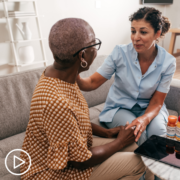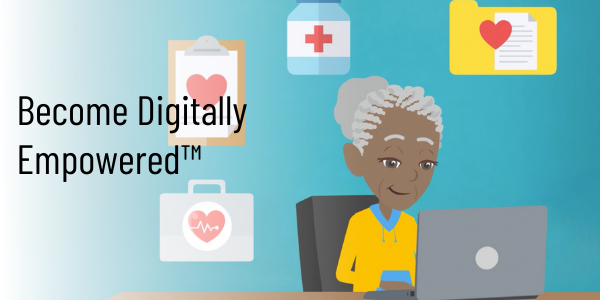Endometrial Cancer Treatment Options for Patients to Consider
Endometrial Cancer Treatment Options for Patients to Consider from Patient Empowerment Network on Vimeo.
What do endometrial cancer patients need to consider for treatment options? Expert Dr. Ebony Hoskins explains key factors that play into treatment decisions and recommended questions for patients to ask their doctor.
Dr. Ebony Hoskins is a board-certified gynecologic oncologist at MedStar Washington Hospital Center and assistant professor of Clinical Obstetrics and Gynecology at Georgetown University Medical Center.
[ACT]IVATION TIP
“…asking the right questions in terms of “How effective is this treatment that you’re recommending? Do you think it’s worth the side effects? Is my quality of life going to be affected? Can I still travel?”
Download Guide | Descargar Guía en Español
See More from [ACT]IVATED Endometrial Cancer
Related Resources:

Emerging Endometrial Cancer Treatments | Promising Data and Challenges |

What Endometrial Cancer Patients Should Know About Clinical Trials |

|
Transcript:
Mikki:
Dr. Hoskins, how do you work with your patients to make treatment decisions and what increase in treatment options, what should endometrial cancer patients consider when deciding on treatment?
Dr. Ebony Hoskins:
So I think this is a good question. In terms of patients up front, I think we follow kind of certain guidelines, if you will and providing standard of care and the first frontline therapy is pretty standard, right? In terms of advanced treatment, when patients recur and we have to look at alternate treatment therapies, I always look at the patient, I always look at what their medical problems are or any side effects. And, of course, the data to see how well are they going to do what side effects and quality of life?
There are numerous factors that are not just something looking in a book and say, “Okay, I’ll take A,” right? Like I think we have to look at all of that and make a decision with our patients over undergoing the side effects, the efficacy, all of these things that are in mind when we talk to patients. So my activation tip for patients would be being involved in the decision-making, asking the right questions in terms of “How effective is this treatment that you’re recommending? Do you think it’s worth the side effects? Is my quality of life going to be affected? Can I still travel?” Those are questions like, we want to live, right? And I don’t think anybody wants to be stuck every three weeks getting treatment or…so those are questions to ask in terms of like, quality of life. And so those are questions that I would recommend you ask your doctor when you’re deciding what treatments.























